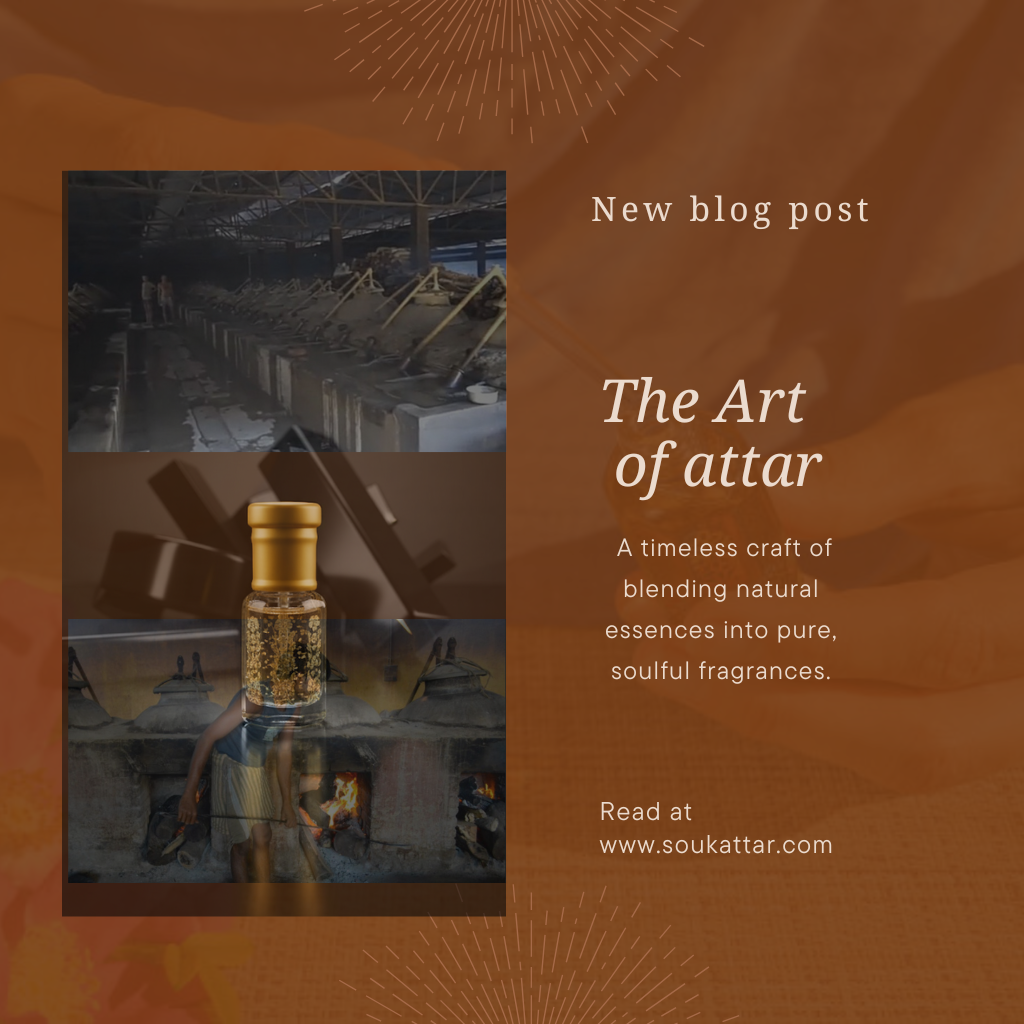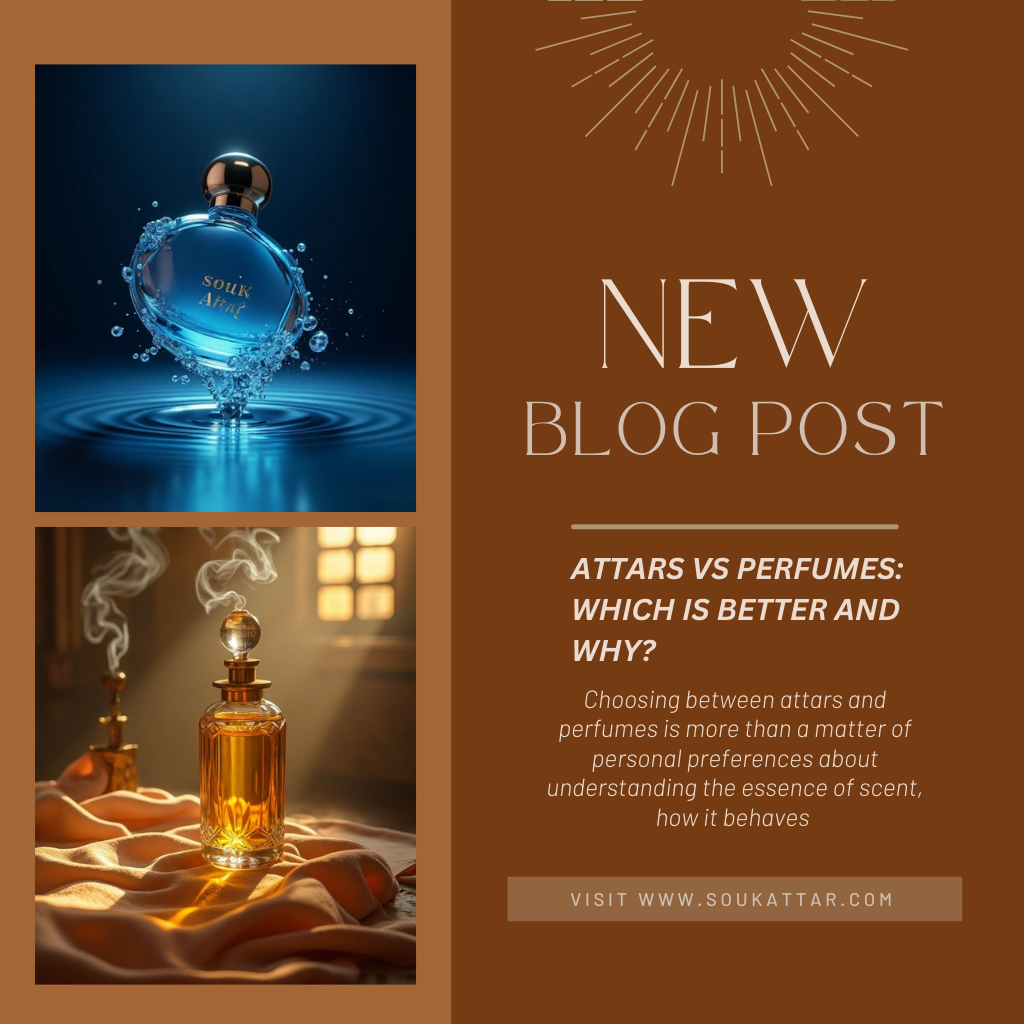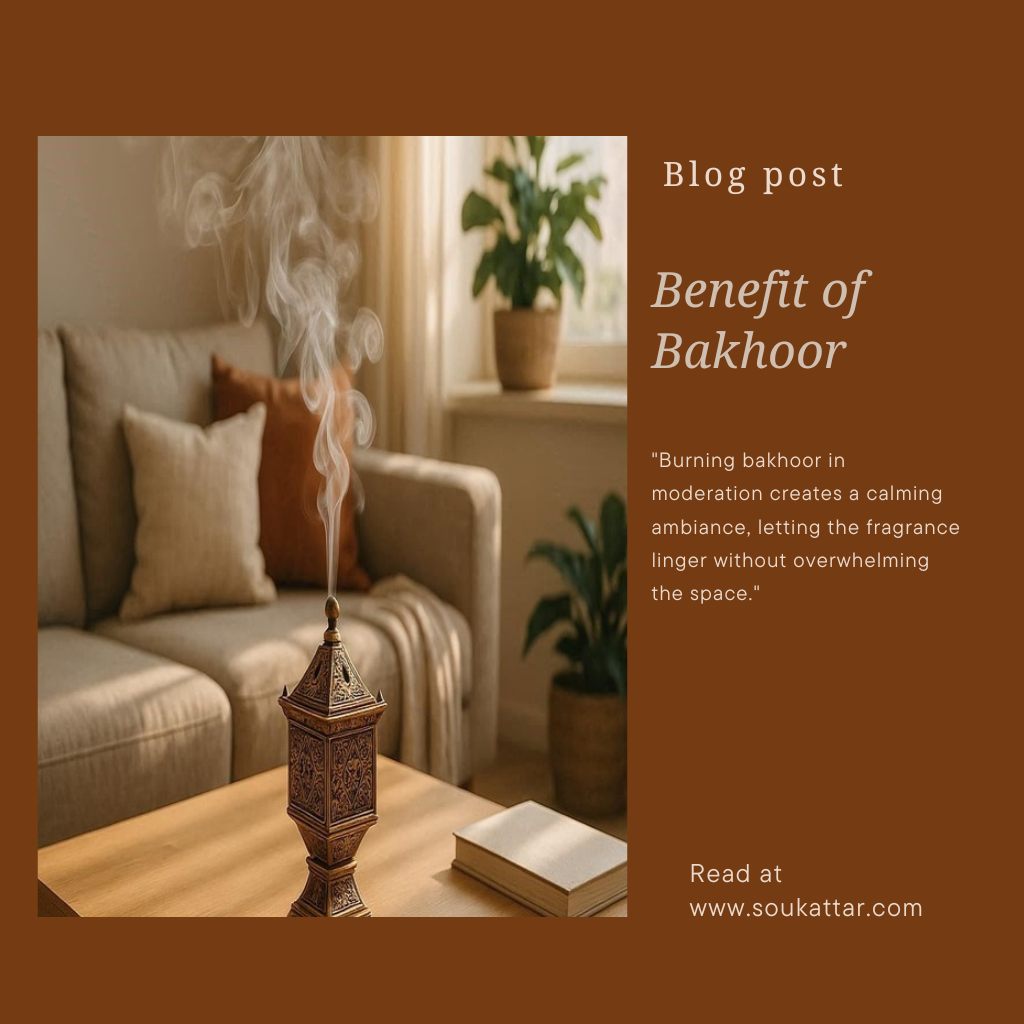
The Arts of Attar: The Spiritual and Cultural Significance of Attars in Islam and Indian Traditions
In a world driven by fleeting trends and synthetic conveniences, attars—or natural perfume oils—hold a place of quiet dignity. They are not just fragrances bottled in ornate glass vials, but vessels of memory, spirituality, and identity. Rooted in centuries-old customs and sacred rituals, attars occupy a revered space in Islamic practices and Indian cultural heritage, intertwining scent with the soul in a way that transcends time and geography.
To wear attar is to wear history. It is to adorn oneself not merely for the world, but for the Divine, for the self, and for the moments of reflection that stitch our days together. When one dabs a drop of rose on the wrists before prayer, or wafts sandalwood onto the scarf before leaving for a celebration, one is participating in a deeply personal ritual that echoes the footsteps of saints, sages, emperors, and poets.
🌙 Attars in Islamic Tradition: A Fragrance Favoured by the Prophet
Among the many sunnah (traditions) of the Prophet Muhammad (peace be upon him), the use of fragrance holds a uniquely gentle charm. It is well documented in numerous hadiths that the Prophet loved perfume, particularly musk, and never refused it when offered. The Prophet is reported to have said: “Of the things of this world, women and perfume have been made dear to me, and the comfort of my eyes is in prayer.” (Surah al-Nasa’i)
This affection for fragrance was never merely about smelling pleasant—it was a reflection of inner cleanliness, spiritual readiness, and respect for others and for the act of worship itself. Wearing attar before entering the mosque or beginning salah (prayer) is considered a way of purifying oneself, enhancing one's presence before God. It is also an expression of ihsan (excellence), wherein a believer adorns their outer self in harmony with the beauty of their inner self.
What distinguishes attars from synthetic perfumes in this context is their purity. Traditional Islamic principles prohibit alcohol consumption, including the use of alcohol in perfumes. Thus, non-alcoholic attars are not only permissible but preferred—especially in religious spaces. The simplicity of their composition—usually just a single floral, woody, or resin-based essence in a sandalwood base—makes them ideal for spiritual use.
In Sufi circles, fragrance is even more potent: it becomes part of the dhikr (remembrance of God). Before gatherings of spiritual recitation, a dab of attar is often passed among participants, symbolizing both unity and preparation. For many, the scent becomes a spiritual trigger—reminding them of prayer, of peace, of divine proximity.
In the Sacred Aroma of India: Attars in Cultural and Festive Life
In Indian traditions, the story of attar begins not with commerce, but with ritual. Long before the Mughal emperors elevated it to imperial luxury, fragrance was intrinsic to the Vedic world. Flowers, woods, herbs, and resins were used in yajnas (fire rituals), temple offerings, and Ayurvedic treatments—not simply to please the senses, but to invoke deities, cleanse energy, and sanctify the space.
With the advent of Islamic rule in India and the rich fusion of Persian, Arabic, and indigenous traditions, attars took on new life. The artisans of Kannauj, India’s “perfume capital,” became the keepers of this sacred alchemy, distilling jasmine, vetiver, rose, and saffron into earthy oils that became indispensable in both temples and palaces. For Hindus, sandalwood is especially sacred—used to anoint idols, mark the forehead, and cool the body in the sweltering heat. For Muslims, Ruh-E-Gulab and Shamama are treasured in prayer and festivity alike.
The role of attars in Indian weddings, for example, is profound. Beyond being mere adornment, fragrance is woven into the very fabric of the celebration—from the ritual application of sandalwood paste on the groom’s face to the floral attars dabbed on the bride’s wrists. It is believed that fragrance attracts not only joy but good fortune, and that it forms a memory trail of blessings. In many households, a vial of attar is handed down through generations—a fragrant heirloom, rich with familial intimacy and cultural pride.
💠 More than Perfume: An Emotional Bridge to the Divine and Ancestral
The emotional resonance of attars lies in their quiet intimacy. Unlike loud synthetic perfumes designed to announce one’s presence, attars invite people in. Their subtlety makes them ideal for private reflection, spiritual practices, and the most personal moments of joy and sorrow.
In both Islamic and Indian traditions, attars are often used to honor the departed. During funerals, it is common to apply sandalwood oil to the body or clothing of the deceased. Rose water may be sprinkled on the grave. These acts, gentle and fragrant, are not mere ritual—they are acts of love, connection, and continuity. They say, “We remember you,” not just with thoughts but with scents that carry memory itself.
Similarly, in moments of celebration, attars lend a sacred sheen to the festivities. A bride dabbing jasmine behind her ears; a pilgrim carrying oud from Makkah; a child applying mitti attar after the first monsoon—these are not transactions. They are rituals of meaning, where scent becomes a language that words can’t always express.
🌸 Attars in the Contemporary Context: A Return to Roots
Today, as the world rediscovers slow, intentional living, attars are being re-evaluated not as outdated relics, but as timeless tools of well-being and identity. In an era of hyper-consumerism, where everything is branded and mass-produced, attars offer something profoundly human: the trace of a flower, a prayer, a memory.
More and more, modern consumers, especially from the Indian diaspora and the global Muslim community looking beyond flashy packaging to reconnect with heritage. They are seeking attars not just to smell good, but to feel grounded, to honor sacred moments, to build fragrance wardrobes that reflect cultural roots and personal values.
From weddings and Eids to meditation and journaling, attars are becoming part of new rituals as well. Brands that tell these stories of ethical distillation, of historical significance, of spiritual alignment, don’t just sell perfume; they offer entry into a world of meaning.
✨ A Fragrant Legacy Worth Preserving
To wear attar is not to follow a trend; it is to step into a lineage. It is to carry forward an unbroken chain of fragrance that connects us to prophets, poets, mystics, and monarchs. It is to say: I remember who I am. I honor where I come from.
Whether you’re exploring attars for the first time or you grew up with the scent of sandalwood wafting through your grandparents’ home, know this: attars are more than perfume. They are devotion in a bottle, culture you can wear, and a prayer that lingers on the skin.
So the next time you uncap a vial of Ruh Khus or jasmine oil, close your eyes. Inhale not just the scent, but the centuries it carries. And in that breath, let memory, faith, and fragrance become one.
Conclusion: A Scented Legacy That Transcends Time and Faith.
Attars, in all their natural richness and aromatic complexity, carry far more than just fragrance they carry stories. Stories of faith, of culture, of traditions passed down like treasured heirlooms. In both Islamic and Indian traditions, these oils do not merely exist to scent the body, but to elevate the spirit, ground the soul, and preserve centuries-old rituals in the modern world.
In Islam, attars are closely tied to personal purity and spiritual readiness. The Prophet Muhammad (peace be upon him) not only loved fragrance but also encouraged its use. His example transformed the use of perfume from a simple cosmetic into an act of Sunnah. The application of attar before prayer, during religious gatherings, or simply as part of daily life is more than a sensory choice’s a mindful, reverent gesture. For many Muslims, especially during sacred times like Jummah (Friday prayers), Eid, or even during Hajj and Umrah, wearing attar becomes a quiet act of devotion, a way to honour their faith with grace and humility.
This deep association with purity and intentional living has elevated attars to something sacred in Islamic culture. Because these perfumes are alcohol-free, they also comply with the traditional Islamic guidelines for personal care. Thus, when someone chooses an attar like musk, rose, or oudh, they’re not just selecting a scent they're embracing a form of worship, a spiritual habit, and a legacy of the Prophet.
Meanwhile, in Indian traditions, the spiritual use of attars is equally layered and meaningful. India, being the birthplace of many philosophical and religious schools of thought—Hinduism, Buddhism, Jainism, and Sufism, among others, has always found a spiritual connection with scent. In ancient Hindu rituals, fragrance has long been associated with devotion (bhakti) and the concept of offering the five senses to the divine. The burning of incense, the sprinkling of rose water, and the dabbing of attars on the body were all means to purify the self and the surroundings before approaching the divine.
Temples often carry the scent of sandalwood fragrance associated with Lord Vishnu, as well as with peace and detachment from the material world. Jasmine is offered to deities like Lord Shiva or Goddess Lakshmi, and roses are linked to beauty, love, and divine femininity. Each scent speaks its own language and invokes a specific emotion or energy. In Ayurvedic philosophy, attars are used for balancing the doshas (Vata, Pitta, and Kapha) and enhancing emotional and physical well-being, further proving how fragrance is intertwined with both the sacred and the scientific in Indian heritage.
And then there's Sufism, the mystical dimension of Islam, that weaves the spiritual significance of attars even deeper into the heart of devotion. For the Sufis, attars are not just about physical presence but spiritual awakening. The scent becomes a metaphor for divine love subtle, lingering, and profoundly moving. A whiff of mitti attar (the earthy fragrance distilled from baked clay) can evoke humility and connection with the earth, while oudh inspires introspection and soulful reflection. In Sufi shrines across India and Pakistan, devotees often apply attar before offering prayers or visiting tombs of saints, believing that the aroma brings spiritual clarity and closeness to God.
What’s truly beautiful is how these practices, though diverse in rituals and rooted in different faiths, meet at the shared belief that fragrance holds the power to transcend the physical and connect us to the divine. The wearing of attar is, in essence, a mindful pause—a moment of reflection, of grounding, and of spiritual expression. It teaches us that beauty need not be loud to be felt; sometimes, the quiet aura of a floral note or a woody base can stir something within that words cannot.
Even beyond religion, attars have shaped cultural expressions of hospitality, love, and celebration in the Indian subcontinent. Be it a wedding where guests are greeted with a touch of gulab attar, or a festival where clothes and prayer spaces are infused with sandalwood oil, the presence of attar adds depth and dignity to the moment. In many families, attars are passed down through generations, each vial telling the story of a grandfather’s prayer routine or a mother’s bridal preparations. These personal histories are what keep the tradition alive in a fast-paced, synthetic world.
Today, as natural perfumery makes a quiet comeback, attars are finding relevance again not just for their purity, but for their profound cultural and spiritual symbolism. Consumers are seeking more than scent; they’re looking for stories, heritage, intention. They’re reconnecting with rituals that feel lost in the noise of modernity. Whether it’s a young woman applying jasmine attar before meditation, or a man wearing oudh before stepping into the mosque, these moments of fragrance become acts of self-care, memory, and devotion.
In preserving and cherishing attars, we are preserving something more than ancient perfumery techniques we are preserving the soul of a culture. A soul that values beauty not just in how we look, but in how we feel, how we pray, how we connect. A soul that believes that what we carry on our skin should also uplift our hearts.
So, the next time you open a small glass bottle of attar, know that you are holding centuries of wisdom in your hands. It is not just perfume. It is prayer. It is poetry. It is culture in liquid form. And above all, it is a gentle, fragrant bridge between the material and the spiritual, the past and the present, the sacred and the everyday.
✅ Frequently Asked Questions (FAQs)
❓ What is attar perfume?
Attar is a natural, oil-based perfume made from flowers, herbs, woods, and resins using traditional distillation methods. It is alcohol-free and known for its long-lasting and skin-friendly fragrance.
❓ How do I choose the right attar for my personality?
To choose the right attar for your personality, consider your natural traits. Confident and bold personalities suit oud-based attars, romantic personalities prefer rose or jasmine, while calm and introspective people often enjoy sandalwood, vetiver, or mitti attar.
❓ Which attar is best for different moods?
Different attars support different moods:
For relaxation: Vetiver, Sandalwood
For happiness and energy: Citrus, Rose
For focus and clarity: Frankincense, Basil
For romance: Musk, Jasmine, Oudh
❓ Can attar change or improve mood?
Yes, attar can positively influence mood. Natural fragrances interact with the brain’s emotional center, helping reduce stress, uplift mood, increase focus, and create emotional balance.
❓ Is attar better than synthetic perfume?
Attars are often preferred over synthetic perfumes because they are natural, alcohol-free, longer lasting, and gentler on the skin. They also blend more naturally with body chemistry and evolve slowly over time.
❓ Which attar is best for daily use?
For daily wear, light and fresh attars like sandalwood, vetiver, rose, citrus, or neroli are ideal. They are not overpowering and remain pleasant throughout the day.
❓ How should attar be applied correctly?
Apply attar on pulse points such as wrists, behind the ears, inner elbows, or lightly on clothes. Use only a small amount, as attars are highly concentrated.
❓ Does attar smell the same on everyone?
No, attar reacts differently to each person’s body chemistry. The same attar may smell slightly sweet on one person and more woody or deep on another.
❓ Which attar is best for summer and winter?
Summer: Vetiver (Khus), Rose, Citrus, Mogra
Winter: Oudh, Musk, Sandalwood, Amber
Seasonal choices help the fragrance perform better and feel more comfortable.
❓ Is attar suitable for sensitive skin?
Yes, most natural attars are suitable for sensitive skin because they are alcohol-free. However, it’s always best to do a patch test before regular use.
❓ Can men and women both use attar?
Yes, attars are unisex. Fragrance choice depends more on personality and mood than gender. Oud, sandalwood, rose, and vetiver are loved by both men and women.
❓ How long does attar last?
A good quality attar can last anywhere from 6 to 24 hours, and sometimes even longer on clothes, depending on the ingredients and weather.
❓ Why is attar connected to memory and identity?
Scent is closely linked to memory. Attars, being deep and natural, often become associated with personal moments, emotions, and identity, making them powerful signature fragrances.
❓ Can I use more than one attar?
Yes, many people layer or rotate attars based on time, mood, or occasion. This helps create a personal scent story unique to you.




